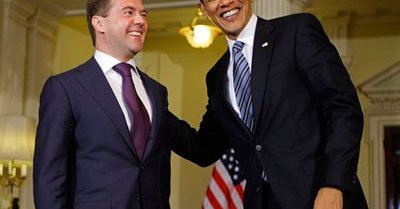There are basically three categories of nuclear-weapon States: There are four Great Powers— the USA, the Russian Federation, China and India. They are Great Powers by their land size, population, economic position, and culture. They would be Great Powers even if they did not have nuclear weapons. On these four standards, the Russian Federation has been declining. Its land size has lessened since its incarnation as the Soviet Union. Its population declined from the Soviet period as States became independent, but the Russian population itself is declining due to poor health; its economy is too linked to the sale of energy. Russian culture without the ideological drive of Marxism has little appeal to non-Russians. Thus nuclear weapons remain an important criteria of its Great Power status.
There are two Nostalgic Great Powers with nuclear weapons: France and Great Britain. They still have a certain Great Power status because they have been at the centre of world politics for a long time. They had colonial empires so that elements of their culture are respected in other parts of the world. Both have long-established diplomatic services which can use their national strengths to good advantage. Both are part of the European Union which gives a certain economic depth. Both England and France would have about the same role in world politics if they did not have nuclear weapons, but since they do, they play a certain role in nuclear-weapon strategic discussions.
There are three Existential Nuclear-weapon States: North Korea, Pakistan, and Israel. All three were created by partition of larger States after the Second World War. Their continued existence is largely based on their having nuclear weapons so their neighbours will not attack them. Were the three States to disappear, they would not be missed by the larger world society so their existence as States depends on their having nuclear weapons.
There is one State, Iran, which falls somewhere between a potentially Existential Nuclear-weapon State and a regional power whose position would be recognized by others. For the moment, a large number of States would prefer not to see a nuclear-weapon Iran but have done little to confer on Iran the recognition of its Regional Power states.
What the USA and the Russian Federation do or do not concerning their nuclear weapons has little impact on world politics, but fewer weapons is not a bad thing in itself. World politics turns on the strategic future of the Existential Nuclear-weapon States, primarily Pakistan and Israel. A North Korea with nuclear weapons will not be attacked by South Korea or China, but probably would not be attacked by South Korea or China in any case.
What the USA and the Russian Federation do or do not concerning their nuclear weapons has little impact on world politics, but fewer weapons is not a bad thing in itself
Relations between India and Pakistan remain crucial. Pakistan could come apart without much difficulty. It’s regions are restless, and the spill over of the conflicts in Afghanistan has increased its fragile nature. The India-Pakistan-China triangle merits much more conflict reduction efforts than it gets.
The Israel-Iran-Arab world tensions are the “daily bread” of world politics, but the reduction of tensions seems unlikely. While a Middle East nuclear-weapon free zone would be an intelligent step forward, we may not see it “in my lifetime” either.
Where does this leave the US-Russian negotiations and their impact? Basically, a US-Russian agreement is better than not having such an agreement. A few days after the Prague signatures, there will be a large 48-State Nuclear Summit in Washington. Had there been no US-Russian agreement, other States would have considered the call for a “nuclear-weapon free world” as totally hollow. Plus in May, at the UN in New York, there will be the five-yearly review of the Treaty on the Non-Proliferation of Nuclear Weapons (NPT). In 2005, no “Final Statement” text could be agreed upon. A failure twice in a row would present some dangers to the Treaty, even if the Final Statements since the first review in 1975 have set out good ideas never followed by action. Thus, some US-Russian progress was needed prior to May.
The parliaments of both Russia and the USA must ratify the START, the US Senate by a 2/3 majority vote, meaning 67 Senators, the Duma (the lower Russian legislative chamber) by a majority vote. Some Russian legislators have complained that the START agreement is too unfavourable to Russia. Given the strong majority that Vladimir Putin’s United Russia party holds in the Duma however, it is unlikely that there will be a massive legislative protest. There could be some delay in the ratification process, delay being a tactic used before in the Duma.
Ratification by the US Senate may prove more difficult. Already 41 Republican Senators have written to President Obama indicating that they would vote against ratification if the START cut back on the US missile defence program. The US has agreements with Romania, Bulgaria and Poland to set up missile defence sites when plans were cancelled to put them in the Czech Republic after strong popular opposition there. Mention of missile defence, a sharp issue during the US-Russian negotiations, which were carried out as they were during the Cold War years in Geneva, has been put into the preamble of the Treaty which is not considered binding. Missile defence is a topic which will be taken up again and again;
Ratification by the US Senate may prove more difficult. Already 41 Republican Senators have written to President Obama indicating that they would vote against ratification if the START cut back on the US missile defence program
Fewer nuclear weapons does not mean that the US and Russia are not trying to develop better nuclear weapons. Both States want to “modernise” their nuclear weapons, and the USA has increased its nuclear-weapon budget.
Thus let us welcome the signing in Prague. Better US-Russian relations can be a good thing; it depends on how they use a lowering of tensions. Fewer nuclear weapons can also be a good thing, but START does little to modify the dangers of world politics. The Washington Nuclear Summit of 12 April will be a test to see if the European political leaders have anything new to say. In any case, the tensions of a nuclear-weapon world are such that “civil society” cannot relax and let the political leaders set all the policies. There is a need for a renewed impact of civil society on governmental strategic policies.


Follow the comments: |
|
